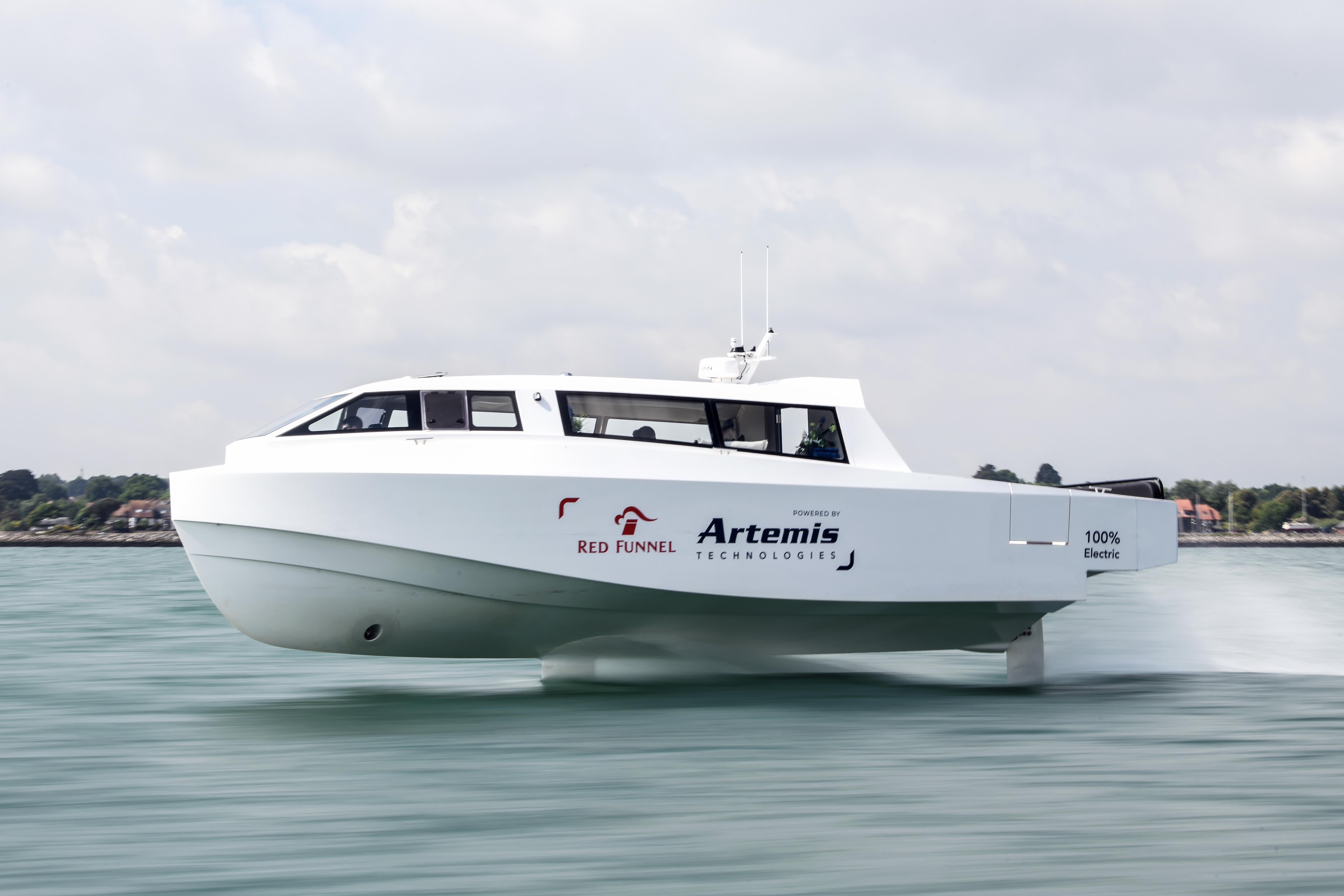Ferry firm hails ‘new era’ of flying electric boats in UK
Red Funnel, which runs ferry services in the Solent, has partnered with Artemis Technologies to launch a zero-emissions vessel in 2026.

The boss of a Solent ferry company has hailed a “new era” of flying high-speed electric ferries in the UK.
Red Funnel, which runs passenger and vehicle services between Southampton and Cowes, Isle of Wight, has partnered with Belfast-based firm Artemis Technologies to launch a zero-emissions foiling vessel next year.
The 150-passenger ferry, which costs between £10-12 million to build, uses advanced hydrofoil technology and modularised battery systems.
The hull lifts out above the water, which significantly reduces drag and wake so that the electric boat can travel longer distances at speed.
The Red Funnel ferry will be plugged in for a quick charge each time it berths and is expected to save up to 3,700 tonnes of carbon emissions each year compared with conventional high-speed ferries.
Its launch in 2026 will follow that of two others built by Artemis Technologies, which are expected to launch in Belfast and Orkney later this year.
Iain Percy, Olympic sailing gold medallist and chief executive of Artemis Technologies, said the EF-24 Passenger is the first-ever electric foiling boat of this size in the world with permission to run commercial services.
“The problem with electric ferries is they really can’t go far or fast,” he said, with challenges including drag and huge amounts of energy from the grid to the batteries that need to be carried on board.
“The flying part here – the foil – it’s the unlocker to do commercially viable range and speed.”
Fran Collins, Red Funnel’s chief executive, said: “This isn’t just a new vessel. It’s the beginning of a new era – defined by zero-emission technology, a smoother passenger experience, and a shared ambition to decarbonise ferry travel.”
Speaking to a stakeholder audience at the Royal Yacht Squadron in Cowes, Ms Collins said the partnership with Artemis allowed Red Funnel to take a “tangible” step in its decarbonisation journey with little risk.
“I was blown away by the technology and blown away by the work and the research that had gone into this,” she said.
The cost of the ferry is an uplift of around 30% compared with conventional ferries but the firm will save an estimated £1 million a year on running costs, with a boat shelf-life of around 25 years, according to Mr Percy.
The Olympic sailor said the firm approached its mission to decarbonise maritime travel with “the ability to save enough energy to justify the cost of the technology”.
“The reality of the world is that we can’t increase costs to decarbonise in the current environment. It’s not going to happen,” he said.
This means both firms expect no increase in Red Funnel passenger fares when the service kicks off next year.
On ticket prices, Ms Collins said: “Iain was very clear that his vision for this is that it’s cost-neutral to put in the technology, and that’s where we expect it to be.
“So from a ticket price perspective, we’re not going to put ticket prices up as a result of having the Artemis vessels in.”

She also said the new boat will help the firm cut service times back to pre-pandemic from 35 minutes to 30 minutes so they can better match up the journey with train times and improve the service’s reliability.
Red Funnel hopes to expand its fleet of electric foiling vehicles and introduce hybrid vehicle ferries but Ms Collins said the grid infrastructure remains a bottleneck to scaling their green ambitions.
In the meantime, the firm has been calling for the Government to exempt lifeline services from the planned UK Emissions Trading Scheme, which will put a cap on the amount of carbon firms can emit while allowing them to buy more allowances to cover their excess.
“I think we need to be very careful,” she said. “I think that imposing charges on lifeline services when there’s no alternative is wrong.
“I think we need to incentivise us all to change but we cannot be responsible for putting in billions of pounds of infrastructure upgrades.
“We have to be careful it doesn’t just become a tax on people because it all comes back to the consumer.”





